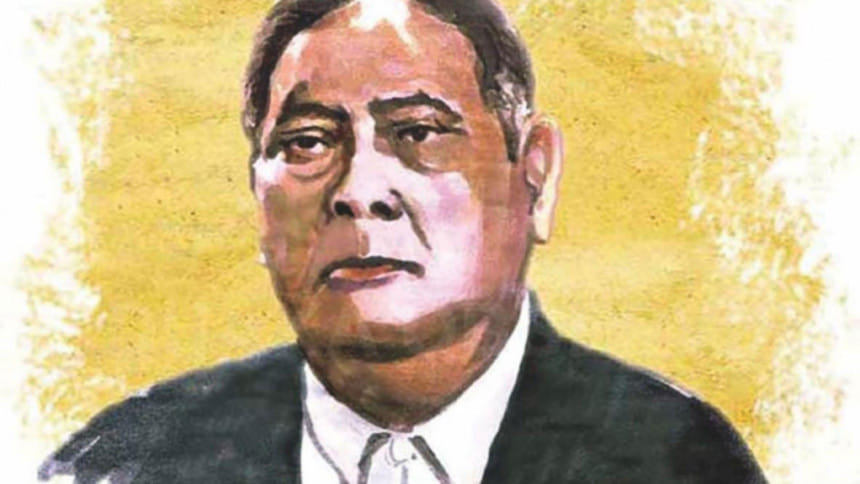‘His ideals still relevant for post-uprising Bangladesh’

Sher-e-Bangla AK Fazlul Huq's politics of rights, agrarian reform, and electoral legitimacy remain crucial for post-July uprising Bangladesh, as the country struggles to redefine justice and democracy, said speakers at a seminar yesterday.Marking the 152nd birth anniversary of Sher-e-Bangla, The Daily Star organised a discussion titled "The Daily Star Itihas Adda: Sher-e-Bangla's Relevance in Today's Bangladesh" at The Daily Star Centre in the capital.Writer and researcher Altaf Parvez said the...
Sher-e-Bangla AK Fazlul Huq's politics of rights, agrarian reform, and electoral legitimacy remain crucial for post-July uprising Bangladesh, as the country struggles to redefine justice and democracy, said speakers at a seminar yesterday.
Marking the 152nd birth anniversary of Sher-e-Bangla, The Daily Star organised a discussion titled "The Daily Star Itihas Adda: Sher-e-Bangla's Relevance in Today's Bangladesh" at The Daily Star Centre in the capital.
Writer and researcher Altaf Parvez said the present time demands a critical and impartial reading of Sher-e-Bangla's life.
Describing Fazlul Huq as a multidimensional and experimental leader, Parvez noted that despite his elite background and early association with the Nawabs and the Muslim League, Huq went on to form the Krishak Proja Party to represent peasants and tenants.
"In the 1930s, the main contradiction was between cultivators and zamindars. Through land reform and debt relief, Huq awakened Bengal with a new consciousness," he said.
Parvez described 1937 as a "disastrous turning point", when Congress's refusal to back Huq forced him into an alliance with the Muslim League. Despite setbacks, he said Huq's 1937–39 ministry implemented major reforms such as free primary education, the Debtors' Relief Act, and job quotas for Muslims.
Referring to the July charter, Parvez said its core agenda of ending discrimination overlooked those who suffered the most -- workers, peasants, Dalits, minorities, women, and students.
July charter's core agenda of ending discrimination overlooked those who suffered the most -- workers, peasants, Dalits, minorities, women, and students.
"Did we pay the debt of blood, or did we betray it?" he asked.
Constitution expert Arif Khan described Fazlul Huq as an "organic intellectual" devoted to education, land rights, and debt relief.
Calling him "a founder of the state of Bangladesh", he said Huq's vision of regional distinctiveness and self-determination predated later nationalist movements.
"The state that was supposed to deliver justice did not do so," Arif said. "We were turned into subjects, like in a kingdom. Sher-e-Bangla gave the subjects back their rights as citizens."
Sher-e-Bangla's life shows that compromise is not weakness but a necessity in leadership. No society can move forward without some level of give and take.
He added that Huq never tolerated authoritarianism. "He believed in elections and not in coming to power by any other means," he said.
Writer and academic Prof Salimullah Khan said placing excessive expectations on any single figure, including Sher-e-Bangla, obscures the larger structural forces that shape history.
He reminded that Fazlul Huq was also a journalist and publisher who launched Nabajug, where Muzaffar Ahmad and Kazi Nazrul Islam once worked. Beyond politics, his reforms in education and peasant debt relief left lasting impacts, he said.
Salimullah said the unresolved constitutional question -- between a federal and unitary state -- lay at the heart of both partition and the 1971 Liberation War.
Without precision in language and honesty about history's constraints, he warned, "Bangladesh risks repeating old errors under new names."
Academic and historian Professor Perween Hasan said Sher-e-Bangla's life shows that compromise is not weakness but a necessity in leadership. "No society can move forward without some level of give and take," she said.
Writer Tarun Yousuf said the recent mass uprising had raised hopes of justice and inclusion, but those hopes remain uncertain. "Sher-e-Bangla becomes relevant whenever the rights of the marginalised remain unfulfilled," he said.
The Daily Star journalist Shamsuddoza Sajen delivered the welcome speech, while the session was moderated by journalist Emran Mahfuz.